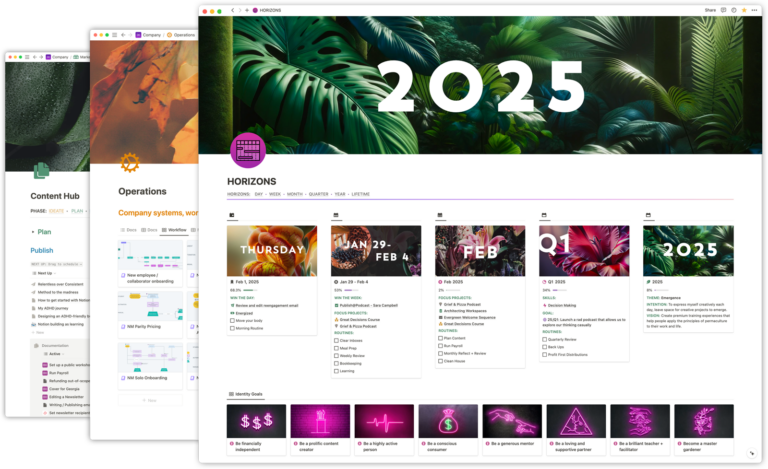Great Decisions Course
At the beginning of the year, I continued my journey with @artofaccomp in participating in the Great Decisions Course. Last year @mariepoulin and I did the Connection Course together and I can definitively say it changed our lives. I suspected going deeper with GDC would similarly impact my life. It’s had some notable changes I wasn’t expecting, however.
The meat of GDC is “emotional inquiry”. We spent time daily doing “EI” in the first few weeks, documenting emotions, and cataloguing what “techniques” we’re using to avoid those emotions. The concept that we generally invite in more of the emotions we’re resisting is notable. You know, you worry that people aren’t going to like the things you publish, so you avoid starting because you don’t want to feel the shame. And then you feel shame anyway because you’re not publishing. Oof.
Speaking of resistance, of course, you know I couldn’t resist building a Notion template to document the journey. The course used a series of Google Sheets documents, and I was missing the dynamism and relational nature of Notion. I built a dashboard to document all these inquiries and share resources with my small group.
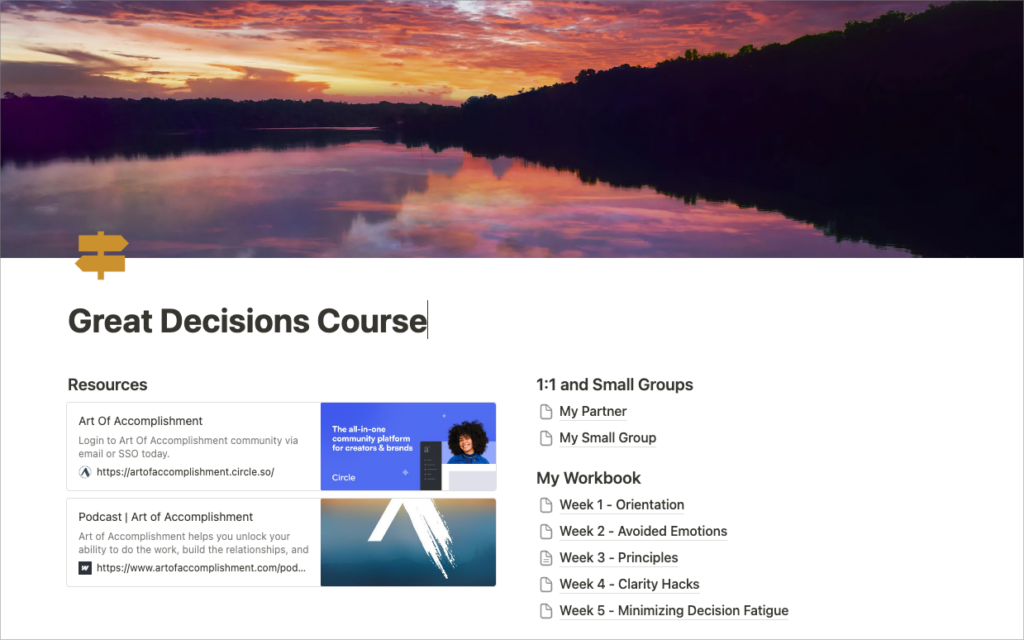
We also developed a set of principles that we ran experiments against (Naturally, these went in the GDC Principles database which is related to the GDC Experiments database). The principles should generally “make decisions” for you and make your decision-making more effective. One of facilitator @FU_joehudson’s is “Embrace intensity”, for example.
One of my core principle ended up being a single word:
Pause.
What it is:
- Gain clarity on emotions before acting reactively or impulsively.
- Expand the elasticity between stimulus and reaction.
- Action on my own time.
What it isn’t:
- Inaction.
- Niceness.
- Indecisive.
And here’s my thoughts from the GDC Principles database on how “Pause” eases decision-making:
My decision-making is eased because I won’t live in fear of regret and shame by starting something too quickly.
I’ll value taking my time with hypothesis and making sure to pause to ask my body how it feels in the moment before taking action.
I’ll know for sure the problems are mine to solve and improve my connection with my loved ones because I’ll be more concerned with connecting with them rather than fixing them.
Throughout the course and EI, something else came bubbling up, which lead to another principle:
Let it flow.
I had originally called this principle “Cultivate Curiosity”, but through the process I realized that I’ve always been a creative person. I don’t necessarily need to cultivate something I am. I just need to let go of feeling like creation must serve a need—directionally towards some perceived outcome. Letting creativity flow from that essense of being felt more true than working to prepare myself for creativity.
After the Course
Shortly after the course ended I had this epiphany that I had been restricting myself from creating things that I enjoyed rather than something that I think other people would enjoy. Maybe it was that Rick Rubin “perform for an audience of one” clip (book still to be read), but I realized and felt an internal identity shift from “I am a DJ” (consumer) to “I am a musician” (creator).
That night I went on Amazon and spent an entire paycheque on a new Rane Mixer and a Roland JD-Xi synthesizer. Cables. 4 software plugins for Ableton. (Are you asking if I “paused” here? Dear reader, I’ve been wanting to upgrade my mixer for a decade).
Of course I immediately started building a Music HQ Notion dashboard. These messy beginnings are my favorite, especially when they are coming from a place of joy—where it flows from you, frictionless.
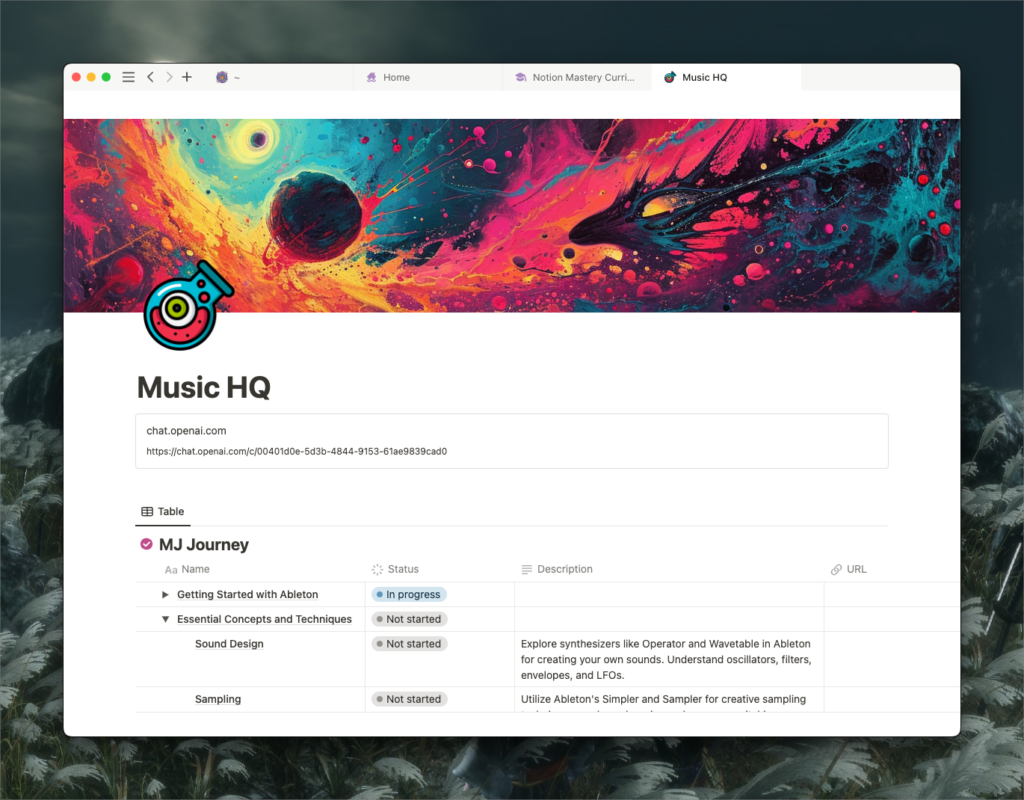
The dashboard encompasses my learning and journey to become the music producer I am, not the one I wanted to be. Yes, I DJ a lot, and I’ve dabbled in making drum and bass music in college, but I’ve never taken it seriously. Now all of a sudden I am. Because I am.
To start I’ve created 4 databases:
- MJ Journey – My plan for learning, sub-items driven. The content was generated by asking ChatGPT to outline a short curriculum for learning Ableton and Synthesizers.
- MJ Resources – The Stuff I’m going to consume to learn. Found some amazing channels on YouTube including Moonboy, Underbelly, et al, that fit the genres I want to produce.
- MJ Tools – A log of Tools I am using and installing to produce. These are related to Resources.
- MJ Dictionary – As I learn new terminology, I am documenting them. Also using this as a global tags database for Resources and Tools (example: “Ableton” is tagged with “DAW”).
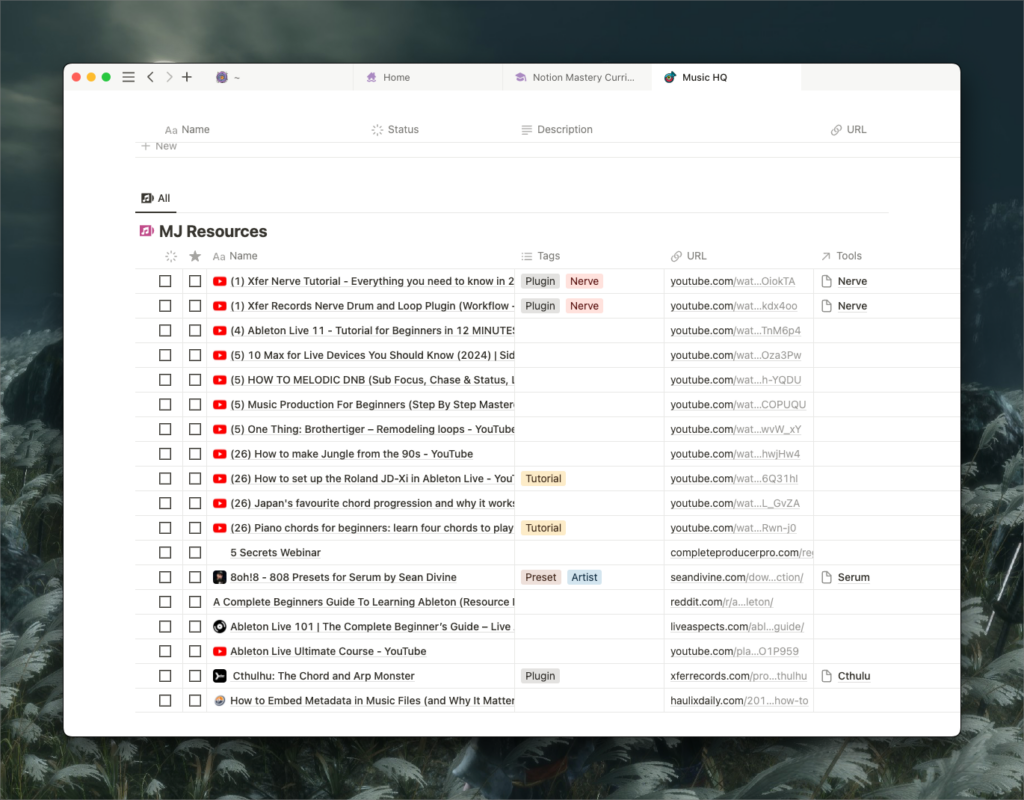
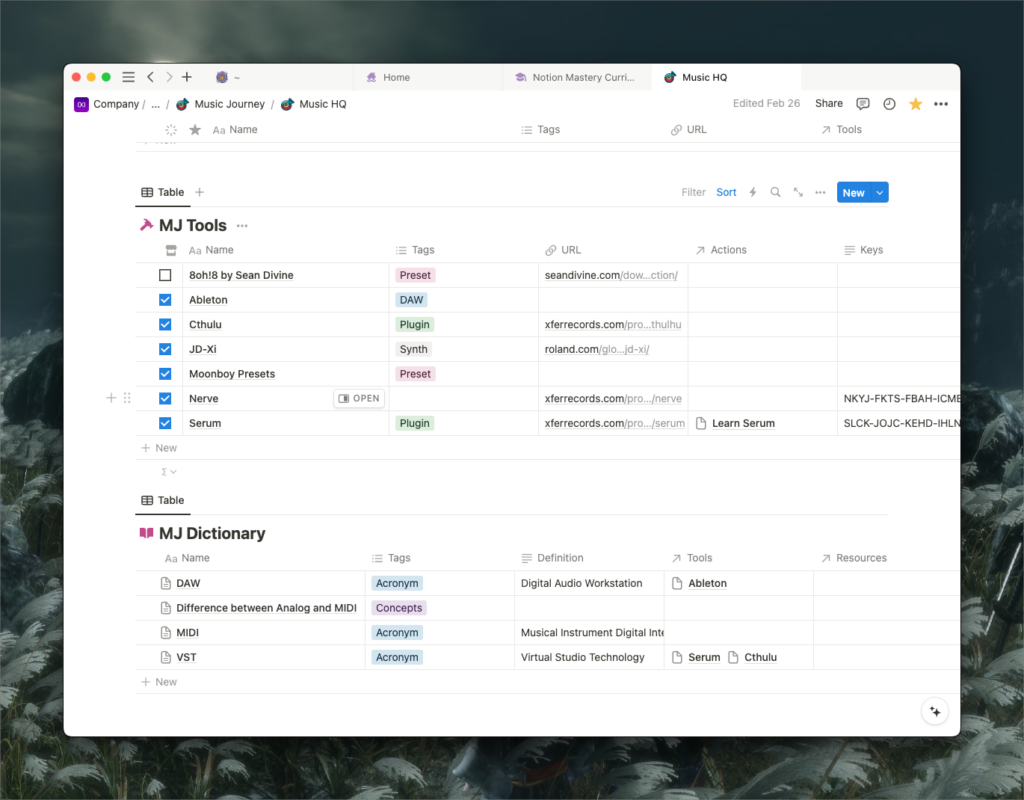
You’ll note I prefixed the databases with “MJ” so I can scope this out in search and make access to API tooling smoother (more on why I do this in my guide on Naming and Nomenclature in Notion).
One tool that’s been awesome here is @TomFrankly‘s Flylighter. I have a “Capture Music Resource” Flow which puts things into my Resources database.
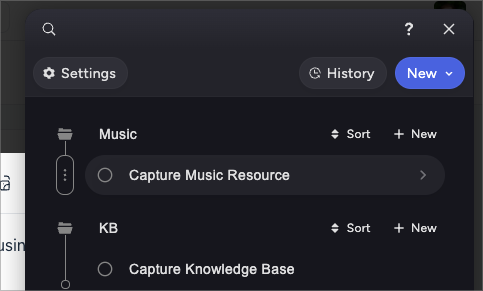
I made a decision to not put my learning journey in our shared Tasks database and segmented my content into a private dashboard. Why? Because I think this might be a valuable resource to share for other aspiring producers.
I’m sure I’ll come up with other dashboards and views, but I thought I’d share the data schema to start. Sometimes this is all you need to explore creatively. In fact, I’m now considering just dropping the “tasks” aspect of the journey because it feels less exploratory than just sitting down at the synth and playing around. Learning through play seems always more embodied than structured curriculum. Both can serve though, so I’ll remain unattached at this point.
Principles Drive Identity
I have this feeling now that intentions are great, but principles drive identity changes. There’s an absolutely wild feeling when you consciously recognize that you have changed your mind about yourself. Noticing that an identity has got you to where you are but is no longer serving is highly empowering. It’s very difficult to describe and I’m somewhat chasing that high at the moment.
In any case, I’m now on day 10 of writing a short song on my JD-Xi daily. I am easily lost in the enjoyment. It’s almost effortless when it’s just for you. Once I have all my wiring equipment, I’m moving to JD-Xi + Ableton learning. I’ll be able to record the short tracks and store them in the upcoming MJ Tracks database, of course. Will keep this song streak going. No goals. No outcomes. Just enjoying playing along to the beat of this new identity, stopping trying to make things and just making things (Thanks, Morpheus).
Notion as a Creativity Engine
This is why I love Notion, this ability to quickly act on and collect information into a clear system that helps you move through the creative experience in a highly visual and dynamic way.
How do you use Notion to document your creative output? Hit me up on Bluesky @typeoneerror.com and let me know.
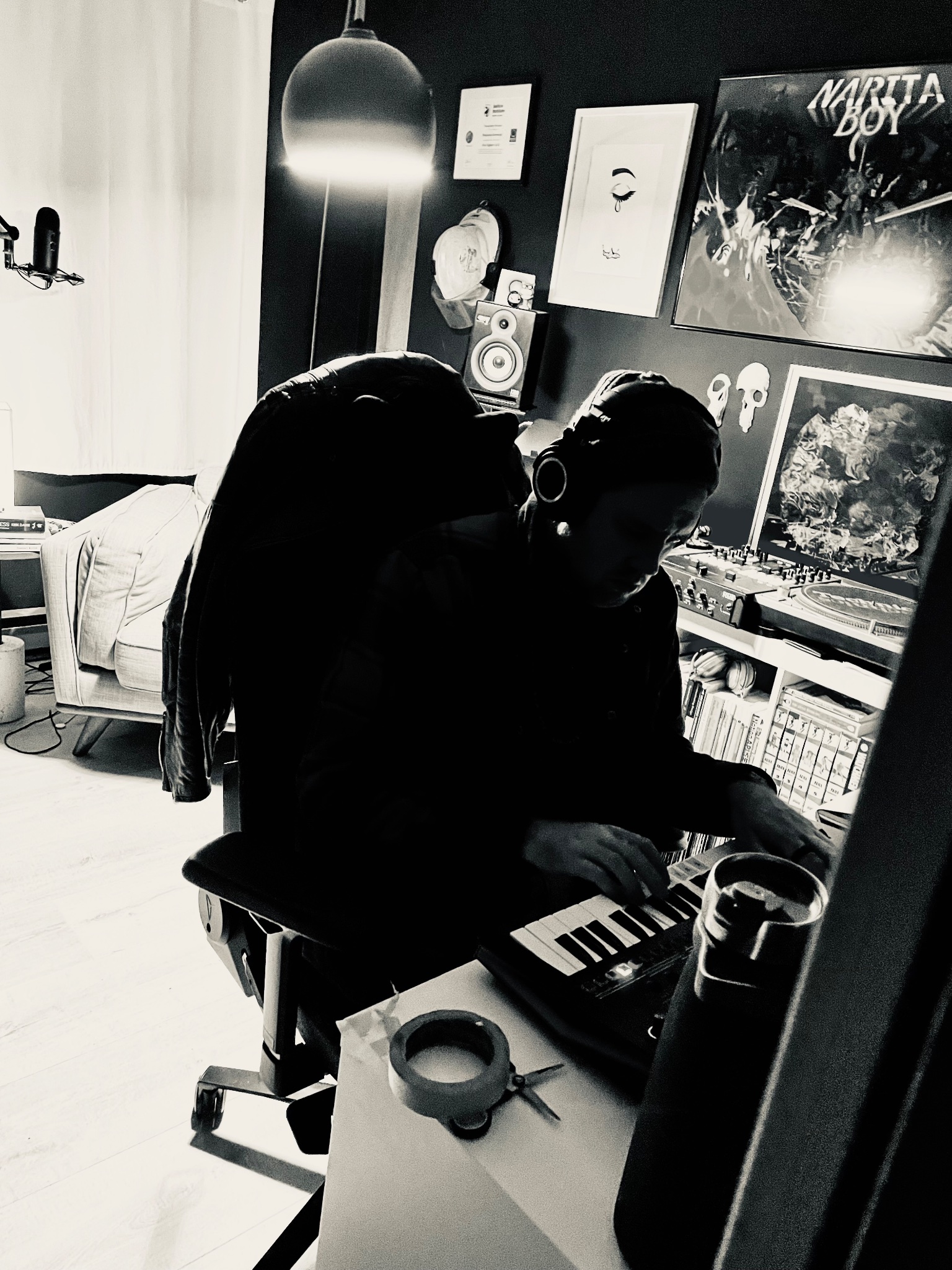

 Notion tips in your inbox
Notion tips in your inbox